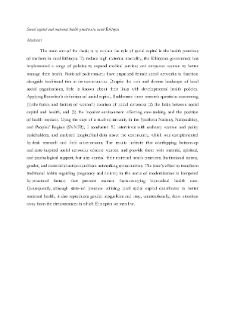- Search in all Repository
- Literature and maps
- Archeology
- Mills database
- Natural sciences
Advanced search
Advanced search
Advanced search
Advanced search
Advanced search

Object
Title: Social capital and maternal health practices in rural Ethiopia
Place of publishing:
Description:
Degree name:
Level of degree:
Degree discipline :
Degree grantor:
Institute of Philosophy and Sociology PAS
Type of object:
Abstract:
The main aim of the thesis is to explain the role of social capital in the health practices of mothers in rural Ethiopia. To reduce high maternal mortality, the Ethiopian government has implemented a range of policies to expand medical services and empower women to better manage their health. National policymakers have organized female social networks to function alongside traditional ties in the communities. Despite the rich and diverse landscape of local social organizations, little is known about their links with developmental health policies. Applying Bourdieu’s definition of social capital, I addressed three research questions concerning (1) the forms and factors of women's creation of social networks (2) the links between social capital and health, and (3) the broader environment affecting care-seeking and the position of health workers. Using the case of a rural community in the Southern Nations, Nationalities, and Peoples' Region (SNNPR), I conducted 50 interviews with ordinary women and policy stakeholders, and analyzed longitudinal data about the community, which was complemented by desk research and field observations. The results indicate that overlapping bottom-up and state-inspired social networks educate women and provide them with material, spiritual, and psychological support, but also control their maternal health practices. Institutional norms, gender, and material situation condition networking opportunities. The state’s effort to transform traditional habits regarding pregnancy and delivery in the name of modernization is hampered by structural factors that prevent women from accessing biomedical health care. Consequently, although state-led pressure utilizing local social capital contributes to better maternal health, it also reproduces gender inequalities and may, unintentionally, draw attention away from the circumstances in which Ethiopian women live.
Relation:
Detailed Resource Type:
Resource Identifier:
Source:
IFiS PAN, call no. P'ED.176 ; In RAD-on system:
Language:
Rights:
Creative Commons Attribution BY-SA 4.0 license
Terms of use:
Copyright-protected material. [CC BY-SA 4.0] May be used within the scope specified in Creative Commons Attribution BY-SA 4.0 license, full text available at: ; -
Digitizing institution:
Institute of Philosophy and Sociology of the Polish Academy of Sciences
Original in:
Joined Libraries WFiS UW, IFiS PAN and PTF
Access:
Object collections:
- Digital Repository of Scientific Institutes > Partners' collections > Institute of Philosophy and Sociology PAS > Thesis
- Digital Repository of Scientific Institutes > Literature > Thesis
Last modified:
Jan 13, 2025
In our library since:
Jan 4, 2021
Number of object content downloads / hits:
797
All available object's versions:
https://rcin.org.pl./publication/188359
Show description in RDF format:
Show description in RDFa format:
Show description in OAI-PMH format:
| Edition name | Date |
|---|---|
| Frankowska, Agata, 2020, Social capital and maternal health practices in rural Ethiopia | Jan 13, 2025 |
Objects Similar
Goszczyński, Wojciech Knieć, Wojciech
Zajda, Katarzyna
Psyk-Piotrowska, Elżbieta Kretek-Kamińska, Agnieszka
Mularska-Kucharek, Monika
Bednarek-Szczepańska, Maria
Chlebicka, Aleksandra Fałkowski, Jan Łopaciuk-Gonczaryk, Beata
Mikiewicz, Piotr
Napierała, Tomasz Leśniewska-Napierała, Katarzyna

 INSTYTUT ARCHEOLOGII I ETNOLOGII POLSKIEJ AKADEMII NAUK
INSTYTUT ARCHEOLOGII I ETNOLOGII POLSKIEJ AKADEMII NAUK
 INSTYTUT BADAŃ LITERACKICH POLSKIEJ AKADEMII NAUK
INSTYTUT BADAŃ LITERACKICH POLSKIEJ AKADEMII NAUK
 INSTYTUT BADAWCZY LEŚNICTWA
INSTYTUT BADAWCZY LEŚNICTWA
 INSTYTUT BIOLOGII DOŚWIADCZALNEJ IM. MARCELEGO NENCKIEGO POLSKIEJ AKADEMII NAUK
INSTYTUT BIOLOGII DOŚWIADCZALNEJ IM. MARCELEGO NENCKIEGO POLSKIEJ AKADEMII NAUK
 INSTYTUT BIOLOGII SSAKÓW POLSKIEJ AKADEMII NAUK
INSTYTUT BIOLOGII SSAKÓW POLSKIEJ AKADEMII NAUK
 INSTYTUT CHEMII FIZYCZNEJ PAN
INSTYTUT CHEMII FIZYCZNEJ PAN
 INSTYTUT CHEMII ORGANICZNEJ PAN
INSTYTUT CHEMII ORGANICZNEJ PAN
 INSTYTUT FILOZOFII I SOCJOLOGII PAN
INSTYTUT FILOZOFII I SOCJOLOGII PAN
 INSTYTUT GEOGRAFII I PRZESTRZENNEGO ZAGOSPODAROWANIA PAN
INSTYTUT GEOGRAFII I PRZESTRZENNEGO ZAGOSPODAROWANIA PAN
 INSTYTUT HISTORII im. TADEUSZA MANTEUFFLA POLSKIEJ AKADEMII NAUK
INSTYTUT HISTORII im. TADEUSZA MANTEUFFLA POLSKIEJ AKADEMII NAUK
 INSTYTUT JĘZYKA POLSKIEGO POLSKIEJ AKADEMII NAUK
INSTYTUT JĘZYKA POLSKIEGO POLSKIEJ AKADEMII NAUK
 INSTYTUT MATEMATYCZNY PAN
INSTYTUT MATEMATYCZNY PAN
 INSTYTUT MEDYCYNY DOŚWIADCZALNEJ I KLINICZNEJ IM.MIROSŁAWA MOSSAKOWSKIEGO POLSKIEJ AKADEMII NAUK
INSTYTUT MEDYCYNY DOŚWIADCZALNEJ I KLINICZNEJ IM.MIROSŁAWA MOSSAKOWSKIEGO POLSKIEJ AKADEMII NAUK
 INSTYTUT PODSTAWOWYCH PROBLEMÓW TECHNIKI PAN
INSTYTUT PODSTAWOWYCH PROBLEMÓW TECHNIKI PAN
 INSTYTUT SLAWISTYKI PAN
INSTYTUT SLAWISTYKI PAN
 SIEĆ BADAWCZA ŁUKASIEWICZ - INSTYTUT TECHNOLOGII MATERIAŁÓW ELEKTRONICZNYCH
SIEĆ BADAWCZA ŁUKASIEWICZ - INSTYTUT TECHNOLOGII MATERIAŁÓW ELEKTRONICZNYCH
 MUZEUM I INSTYTUT ZOOLOGII POLSKIEJ AKADEMII NAUK
MUZEUM I INSTYTUT ZOOLOGII POLSKIEJ AKADEMII NAUK
 INSTYTUT BADAŃ SYSTEMOWYCH PAN
INSTYTUT BADAŃ SYSTEMOWYCH PAN
 INSTYTUT BOTANIKI IM. WŁADYSŁAWA SZAFERA POLSKIEJ AKADEMII NAUK
INSTYTUT BOTANIKI IM. WŁADYSŁAWA SZAFERA POLSKIEJ AKADEMII NAUK




































